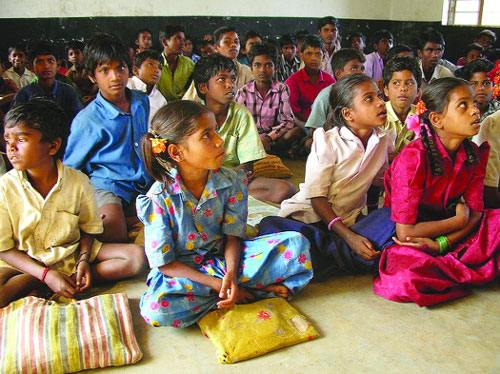Caste-based discrimination and insensitivity ensure that children from diverse social and linguistic backgrounds are pushed out of school, says Seema Rajput
There are 6.21 crore children out of school in India according to the Ministry of Human Resource Development’s 2014 Educational Statistic Report. However, figures derived from the 2011 Census are much higher. Even after seven years of the Right to Education Act 2009 that commits India to universal enrollment and retention of all children, a state like Uttar Pradesh still lacks a definition for school dropout. States that have a definition, lack the mechanism to identify those at risk of dropping out. Even with these data gaps, the dropout rate in India is 19.8 per cent and 36.3 per cent at primary and elementary levels respectively. The highest proportion of drop outs at elementary level consists dalits and adivasis — 38.8 per cent and 48.2 per cent respectively. This reflects India’s unequal education system where poorest quality of schools are provided to India’s poor, and where caste based discrimination and insensitivity ensure that children from diverse social and linguistic backgrounds are pushed out of school.
There can be no quality without equity. While the presence of a motivated, professionally trained teacher is recognised as the most critical prerequisite for the education of a child, India experiences a shortage of 9 lakh teachers, and many more need training. lack of safe and secure environment in schools, especially for girls, absence of separate functional toilets along with discriminatory practices in classrooms and during mid-day meals push more children out from school.
At the community level, child labour and early marriage act as barriers to education. Many states lack sustainable mechanisms to retain migrant children during seasonal migration. The absence of functional crèches or anganwadis leads to increased girls’ dropouts as they are engaged in sibling care.
In this scenario, what has not helped is when governments close schools with small enrollments in the name of “rationalisation”; as many of these frequently cater to dalit and adivasi communities. Mass closure of government schools in states such as Rajasthan, Chhattisgarh, Odisha, West Bengal, Uttarakhand, Uttar Pradesh, Gujarat and Punjab have contributed to dropouts, particularly among girls.
While the problem is big, it’s not insurmountable and thus, a need to formulate ways to check drop out of children from schools in rural and urban areas. A wealth of experience has accumulated in the country in terms of what works for bringing children into school. Quality and equity need to go hand in hand with enhanced quality in government schools to attract out of school children to return to schools that had pushed them out. And the system needs to ensure that all teachers are sensitised to the learning and psycho-social needs of a diverse group of children from marginalised communities. Teachers’ capacities must be strengthened to support classroom learning and provide individual support to students to enable them to acquire age appropriate competencies and instill the joy of learning. For this, there is an urgent need for the system to understand the nuances of the provision of the Right to education Act on special training for out of school children. State governments must develop and adequately fund specific strategies to check and monitor drop outs and improve implementation of special training centres for out of school children.
CARE India has been working to empower women and girls from dalit and adivasi communities and our learnings show that intensive investments are required to address specific barriers that impede access to quality education for girls, particularly adolescent girls. Over the years, in collaboration with various state governments, we have mainstreamed 8.95 lakh out of school girls into age appropriate grades. Our experiences have led us to evolve five key elements which are non-negotiable to implement programming for out of school children. These must be part of India’s strategy to enroll out of school or at risk of drop out children, especially girls.
Pedagogical approach: The processes and methodology must be holistic, should address cognitive and psycho-social needs of out of school children. A fear-free environment and the use of local language are essential to attract and keep girls in school.
Curriculum Design: a special “accelerated curriculum” is also essential to curb the drop out rate. Higher order aspects must also be included in the curriculum so the girls not only acquire information but also the soft skills that are necessary for success in life.
Building leadership skills in girls is critical to enable them to confront the challenges that keep them out of school, negotiate for their education and take decisions for themselves.
Teacher Development: Teachers are critical to the success of this approach. Their training should not only enable them to transmit the curriculum effectively, but also act as a friend and mentor to the girls. Teacher training should include building their awareness and understanding of marginalisation experienced by their students.
Monitoring progress of the initiative, inclusive of child assessment: A process for tracking the progress of an individual child is essential to support them so that they can attain their full potential.
Community Involvement: There is a simultaneous need to work with the families and the larger community to support and sustain progress.
(The author is a technical specialist in education at CARE India)

























